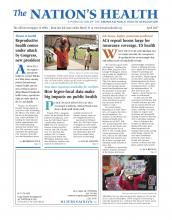If you go to a health care center for treatment, you expect to leave in better shape than before you entered. While that’s generally the case, you could leave with another illness, leading to more medical care, time and money. Health care-associated infections aren’t just spread at hospitals. Patients in all health care settings can take steps to protect themselves.
It’s important to talk to your health provider about ways that you can both work to reduce the risk of infections when receiving care. Patients shouldn’t be shy about discussing prevention, says Susan Moffatt-Bruce, MD, PhD, MBA, chief quality and patient safety officer at the Ohio State University Wexner Medical Center.
She says patients “need to be their own advocate” and “not be fearful to remind a health care provider to do things that would reduce HAI.”
Immunosuppressed patients, meaning people with weakened immune systems, are among the most vulnerable to health care-associated infections, Moffatt-Bruce says. This group includes people who are getting a transplant or receiving chemotherapy. The medications these patients take lower their ability to fight infection. Patients who have surgery after a serious injury are also at risk of contracting HAI.
Health care-associated infections can happen in a number of ways, says the Centers for Disease Control and Prevention, but some are more common. They can happen when germs spread from a catheter or in a place on your body where you’ve had surgery. Patients can sometimes get infections from germs in ventilators. Patients are at higher risk for infections if medical devices haven’t been cleaned properly or if providers haven’t practiced basic hygiene. The good news is that hospitals and health care workers are working hard to prevent infections.
“In general, just because you undergo a surgery or a procedure doesn’t lead you to higher risk (of contracting infections) as long as the right protocol is followed,” Moffatt-Bruce says.
You can protect yourself even before you step inside a health care facility by getting vaccinated against pneumonia and other illnesses, CDC says.
While you’re receiving care, simple measures can make a big difference in preventing infections. Keep your own hands clean, and make sure that the people around you are washing their hands as well. Every provider or staff member who comes into contact with you should also be washing their hands.
“Hand hygiene is incredibly important,” Moffatt-Bruce says. “It helps when patients clearly ask their health care provider, their nurse, their (patient care assistant), ‘Have you washed your hands?’”

Photo by Kali9, courtesy iStockphoto
There are certain red flags that patients should look out for in health care facilities, such as empty hand hygiene dispensers, or no masks anywhere to be seen, Moffatt-Bruce says. There should be an environmental services staff cleaning the building. Also be cautious if providers look ill or are not washing their hands. As a patient, it’s your right to be treated in a clean, well-run facility where all providers and staff are taking the right measures. If you have any concerns, bring them up with the facility’s management.
There may be parts of your procedure that can be cut back to reduce your chances of contracting a health care-associated infection. You might be able to do an outpatient procedure, for example, reducing the amount of time in the hospital.
“Just by virtue of being in the hospital leaves you at higher risk,” Moffatt-Bruce says.
You should receive instructions prior to your treatment, which may include guidelines about bathing or taking an oral antibiotic. Following these instructions is important for preventing infections, and patients who are unclear about what to do should contact their health care facility.
Patients should know the symptoms of health care-associated infections so that they can receive immediate medical attention. If you had an invasive procedure, you may feel pain or redness at the incision site. Diarrhea and fever are also possible signs of infection. If you experience these symptoms, contact the provider who last cared for you or your primary care physician, Moffatt-Bruce says.
Using antibiotics the right way
When you get an infection, your doctor may prescribe you an antibiotic. If you’re given one, always use it as directed. Don’t skip doses or stop taking it when you feel better. Always finish your antibiotics as prescribed.
Using antibiotics that you don’t need or using them the wrong way can lead to superbugs that resist antibiotics. That could make your infections harder to treat.
Talk to your health provider about whether you really need antibiotics for your treatment and how you can be sure that you have the right prescription.
“Every patient should ask, ‘Why am I being started on an antibiotic, why did (my provider) choose that antibiotic and, lastly, how long should I be on this antibiotic?’” Moffatt-Bruce says.
- Copyright The Nation’s Health, American Public Health Association









